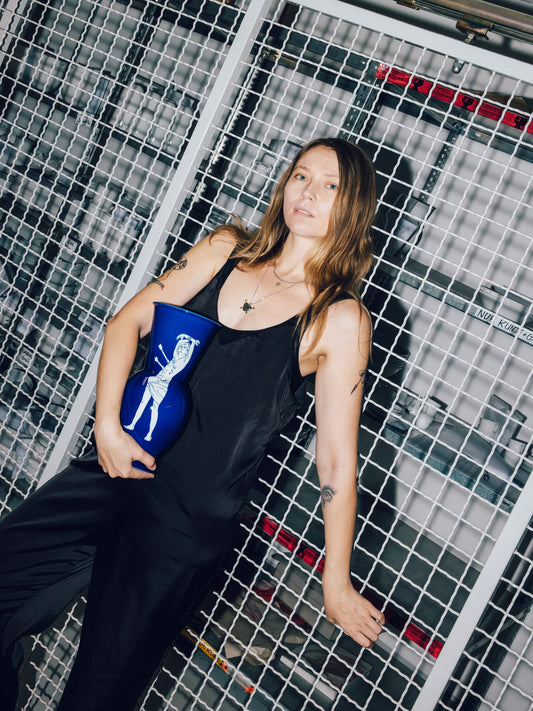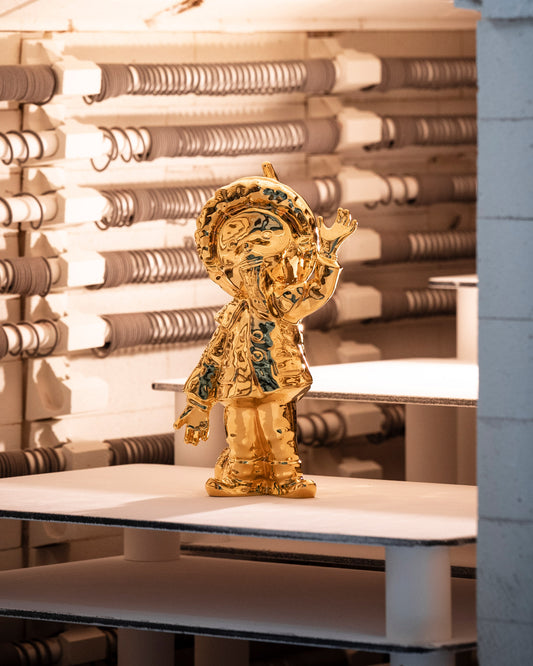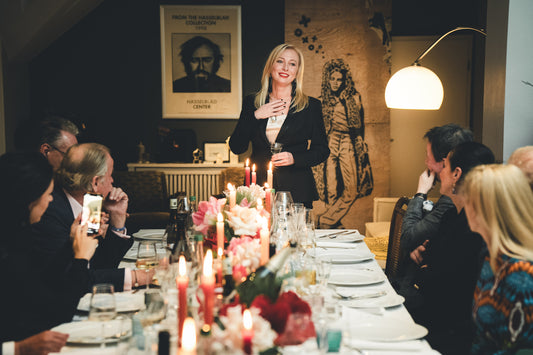ME WITHOUT ME
Erwin Wurm is the most important Austrian artist of our time. For KPM, he has now created a torso that contains a little bit of Donald Duck, a little bit of himself and, above all, a lot of ambiguity. In an interview with KPM employee Sally Fuls, he explains how it all comes together.
The headless vase sculpture is called "Uncle" and was created in collaboration with Galerie König (Photos: Roman März)
KPM: Mr. Wurm, are you a flower person?
Erwin Wurm: Yes, who isn't? I like flowers, we have a large flower meadow here on our doorstep. We leave most of them standing, but every now and then we cut some and put them in a vase.
Should it therefore be a vase for KPM? What is the idea behind the object?
The object shows an item of clothing that does without people. Although it looks as if it is being worn by a person, as if there is a body inside. So it's about this game that I've been playing for a long time: the double skin that represents volume, mass, content, weight. All of this always plays a role in my work. If you look at classical antique sculptures, the beautiful young men and women, you see very massive aesthetic bodies, whether human or horse. But they are formed by a very thin bronze skin. The skin evokes mass and volume, but the truth is that there is only a thin layer of material.
The artist Erwin Wurm (Photo: Michael Wurm)
And why a male torso?
The idea came from a series in which I dealt with precisely this topic, i.e. mass, surface and three-dimensionality. And at some point it seemed obvious to take myself, so to speak. Because that is also me. Me without content, me without ego. Then there is Gottfried Keller's famous phrase "Clothes make the man". So you define yourself with your clothes, present yourself and refer to your social status. Or the other way around: you disguise your social status! There is an infinite amount of play.
And if you say it's you too - why is the object called Uncle and not Erwin?
(Laughs) Well, it's not a self-portrait. If it were, his name would be Erwin. The uncle is a genderless being. The father has a gender and so does the mother. And I was born midcentury in the last century, so I grew up with Donald Duck. And Donald Duck was always just the genderless uncle. And in a way that was the role model, or a play on the genderless figure. This uncle here refers to no personality, there is no individuality. It is an image of a certain suit that certain people wear at a certain stage in their lives. And the head is represented by flowers.
In the future, there will also be a female counterpart.
They already exist, at least in draft form.
And is the counterpart then called aunt?
(Laughs) Well. No. There is no aunt. That would be more of a female first name, or perhaps "avatar". Because in a way it's an avatar, a certain person who is represented by a piece of clothing, which allows you to infer a type.
Can you describe the type of uncle, what kind of man is he?
I don't describe my work myself. I produce something and put it up for discussion. The interpretation remains open. When you look at the object, your own thoughts and perspectives arise.
Well then: I find it curious that an uncle is something genderless for you, because I don't really feel that way at all. I find it almost a little disreputable.
They are, of course, culturally shaped. And this is precisely what underlines my thesis, because they allow the work itself to take effect. Everyone comes with their own history and socialization. And everyone sees it differently. They see the bad uncle who has a gender. But I don't.
To what extent was the material important here? To what extent does porcelain play a role for the object itself?
Porcelain brings with it a history, memories and emotions. Of course my parents had tableware. They drank coffee from it and ate from it on Sundays, it was the good tableware, the beautiful tableware that you were careful with and only used on holidays or Sundays. It has a social connotation: it's about a certain society that doesn't indulge in wealth, which is why this porcelain isn't used every day, but is something special and marks a celebration. And that's how it was with us, my father was a policeman and we didn't have much money. But we did have these things and we were very frugal with them.
And as a child, did you have to or were you allowed to wash the expensive dishes on Sundays? Or did you take the precaution of not putting them in children's hands?
We always had to help, we usually dried the dishes. But with the expensive porcelain... of course we had to be careful.
.


